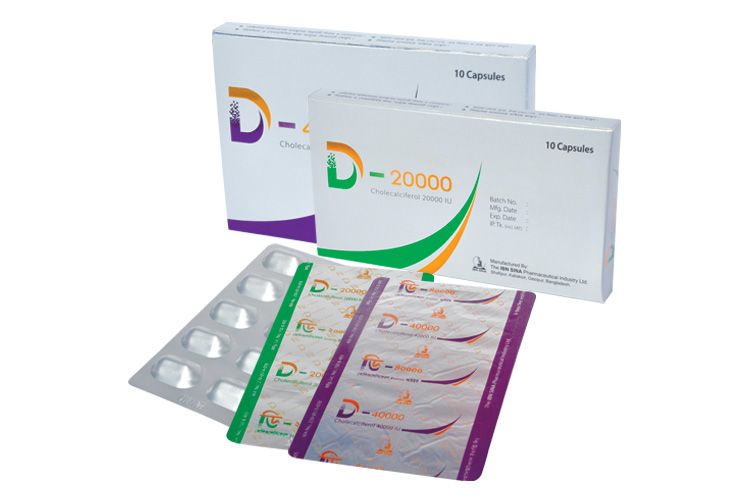
D
CHOLECALCIFEROL [VITAMIN D3] USP
| NAME | STRENGTH | PACK SIZE | DOSAGE FORM |
|---|---|---|---|
| D 20000 IU | 20000 IU | 10 S | CAPSULE |
| D 40000 IU | 40000 IU | 10 S | CAPSULE |
| D 2000 IU | 2000 IU | 50 S | TABLET |
D-2000 Tablet: Each Tablet Contains Cholecalciferol (Vitamin D3) USP 2000 IU.
D-20000 Capsule: Each Capsule Contains Cholecalciferol (Vitamin D3) USP 20000 IU.
D-40000 Capsule: Each Capsule Contains Cholecalciferol (Vitamin D3) USP 40000 IU.
2000 IU (1 tablet) daily with food or within 1 hour after a meal.
Prevention of Vitamin D3 deficiency: Starting dose of 1 capsule (20000 IU) once a month. As an adjunct to specific therapy for osteoporosis: 1 capsule (20000 IU) once a month.
Treatment of vitamin D3 deficiency: 40000 IU once weekly for 7 weeks, followed by maintenance therapy such as 2-3 capsuls per month or 1400-2000 IU/day or as directed by the registered physician.
Keep below 30° C , store at a cool & dry place, protect from light & moisture. Keep the medicine out of reach of children.
D-2000 Tablet: Each box contains 5x10 tablets in blister pack.
D-20000 Capsule: Each box contains 1x10 capsules in blister pack.
D-40000 Capsule: Each box contains 1x10 capsules in blister pack.
